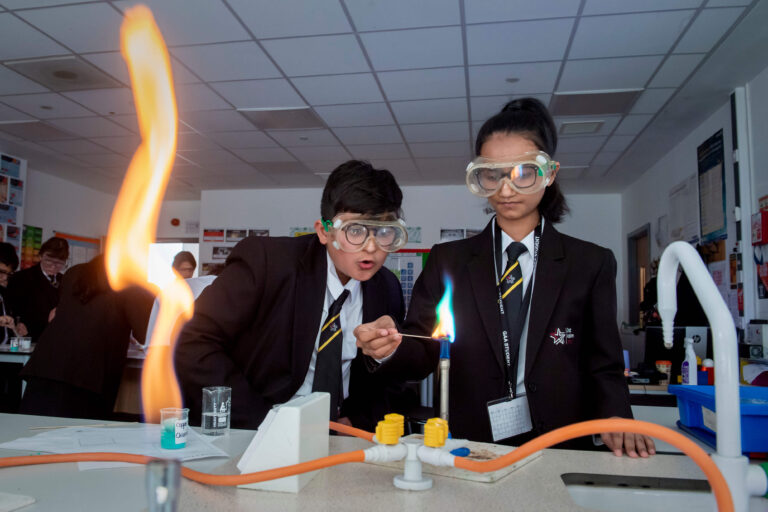Science (Key Stages 3 & 4)

Our vision is to drive our passion for the sciences and to enthuse the students we teach, to help them appreciate and be curious about the sciences and the influence the disciplines have on our daily lives. In this way students our students can make informed decisions, whilst appreciating the wonder and beauty of the world.
Through years 7 to 11 students develop an understanding of the three principle areas of Science.
Biology Big Ideas
● Cells and Cellular Processes
● Biological Systems for Life
● Organisms and their interactions with the environment.
Chemistry Big Ideas
● Materials and their Properties
● Chemical Change
● Our Earth and its Atmosphere
Physics Big Ideas
● Energy
● Forces and Fields
● Matter and Materials
Key Stage 3 Science
| Year 7 | ||
| Term 1 | Term 2 | Term 3 |
| Introduction to science Introduction to microscopy Cells and unicellular organisms Solids, liquids and gases Solutions Mixtures Measuring density | Reproductive systems Gestation and birth Movement Acids and alkalis Different forces Pressure | Ecosystems Biodiversity and human influence Neutralisation The earth’s atmosphere Energy stores and transfers Understanding waves Current electricity |
| Year 8 | ||
| Term 1 | Term 2 | Term 3 |
| The earth’s atmosphere Metals and alloys Reactions of metals Measuring density Food groups and deficiency diseases Drugs Reactions of acids | Combustion Current electricity Static electricity Magnets and electromagnets Respiration | Photosynthesis Solutions Mixtures Physical and chemical change |
| Year 9 | ||
| Term 1 | Term 2 | Term 3 |
| Variation and adaptation Evolution and extinction Atomic structure Water Separations Describing atoms Heating and energy transfers Digestion Movement of substances | Bonding The Periodic Table Energy and efficiency Waves and the electromagnetic spectrum The nucleus Prokaryotic and Eukaryotic cells Microscopy and magnification pH Scale Further reactions of acids | Solving problems with chemistry Describing motion Forces and matter Enzymes Dietary components |
Key Stage 4
Science GCSE follows the Pearson’s specification with students either following the Combined or Separate Science route. In Key Stage 4, students are taught by subject discipline specialists.
| Year 10 | ||
| Biology | Chemistry | Physics |
| Topic 1 Key Concepts in Biology Topic 2 Cells and Control Topic 3 Genetics Topic 4 Natural Selection and Genetic Modification Topic 5 Health Disease and the Development of Medicines Topic 9 Ecosystems and Material Cycles | Topic 2 States of Matter and Mixtures Topic 1 Key Concepts in Chemistry Topic 3 Chemical Change Topic 4 Extracting Metals and Equilibria | Topic 1 Motion Topic 2 Forces and Motion Topic 3 Conservation of Energy Topic 4 Waves Topic 5 Light and the Electromagnetic Spectrum Topic 6 Radioactivity Topic 10 Electricity and Circuits |
| Year 11 | ||
| Biology | Chemistry | Physics |
| Topic 6 Plant Structures and their Function Topic 7 Animal Coordination, Control and Homeostasis Topic 8 Exchange and Transport in Animals | Topic 6 Groups in the Periodic Table Topic 7 Rates of Reaction and Energy Changes Topic 8 Fuels and Earth Science | Topic 8 Energy, Forces doing Work Topic 9 Forces and their Effects Topic 12 Magnetism and the Motor Effect Topic 13 Electromagnetic Induction Topic 14 Particle Model Topic 15 Forces and Matter |
*Students following the Separate Science Pathway in Year 11, are also taught elements from Topic 5:
· Separate Chemistry 1
· Separate Chemistry 2
· Astronomy 7 and 11
· Static Electricity

